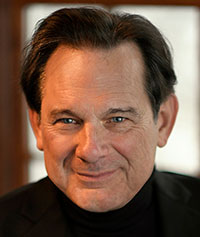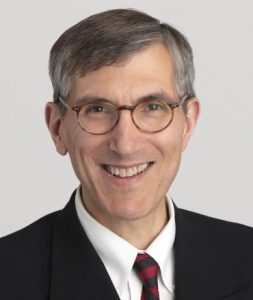Chester B. Whitley, PhD, MD Delivered Keynote Address on Wednesday, February 12, 2020

Dr. Whitley is the Principal Investigator for the Lysosomal Disease Network (LDN), a growing consortium of medical centers collaborating since 2003—and funded by the National Institutes of Health beginning in 2008—to address critical gaps in taking lysosomal disease research from the lab to clinical practice. Chester (Chet) B. Whitley, Ph.D., M.D. is a tenured Professor in the Department of Pediatrics, the Department of Experimental and Clinical Pharmacology, and Director of the Advanced Therapies Program at the University of Minnesota.
In 1983, he conducted the first US trials of bone marrow transplantation for Hurler syndrome, other mucopolysaccharidoses, and selected lysosomal diseases including Krabbe disease and Tay-Sachs disease. With the first transplant for Hurler syndrome in the USA. (September 13, 1983, University of Minnesota)1 and the continuing clinical trials during the next decade2, he characterized the level of response and clinical outcomes. In the case of Hurler syndrome, cognitive testing and imaging showed protection of the brain despite the seemingly impenetrable blood-brain barrier. As the very first efficacious treatment for a lysosomal disease, hematopoietic stem transplant provided the proof-of-principle for development of future enzyme replacement therapies, gene therapy, and other systemic treatments. During these early transplant studies, Dr. Whitley expanded upon the 1960’s “cross-correction” observations at NIH in cultured fibroblasts, and coined the term “metabolic cross-correction” and characterized multiple different mechanisms accounting for the clinical responses in patients. In conversation with the US FDA in the early 1990’s, he coined the term “ultra-orphan disease” to differentiate those conditions that are orders of magnitude more rare than the legislated definition of “orphan disease” with prevalence of <200,000.
Dr. Whitley directs the CLIA-certified Gene Therapy and Diagnostics Lab, the first laboratory in North America to offer complete sequencing of a gene to be offered as a ‘clinical diagnostic’ (non-research) test.
In the late 1990s, Dr. Whitley conducted the first clinical trial of gene therapy for a mucopolysaccharidosis condition, Hunter syndrome3,4. At that time, he invented5 the DMB dye-binding test for measuring urine glycosaminoglycans (GAG), the most common method for quantifying GAG in diagnostic laboratories globally.
He is also responsible for a number of other ‘firsts’: (a) discovering a ‘pseudo-deficiency’ allele for MPS6,7; (b) finding that combining therapies, e.g., enzyme replacement therapy (ERT) after bone marrow transplantation8 may enhance metabolic correction; (c) demonstrating that small amounts of intravenous laronidase enzyme cross the blood-brain barrier and reduces the pathology in the brain, and improves the learning of mice with Hurler syndrome9; and, recently, (d) that intravenous zinc-finger nuclease gene-editing prevents brain disease in mice with Hurler syndrome10 and Hunter syndrome11.
Dr. Whitley conceived and organized the 1st International Symposium on Mucopolysaccharidosis and Related Diseases (May 20-23, 1988, Minneapolis, Minnesota)12. He is also Director of the Gene Therapy Center at the University of Minnesota, supported by an NIH program project grant “Gene Therapy for Metabolic Disease” for two decades (5P01HD032652).
He is the founding Principal Investigator of the NIH-funded Lysosomal Disease Network, coordinating 21 clinical studies at 18 institutions. Dr. Whitley is the founding organizer (May 12-15, 2004, Minneapolis, MN USA) and current course director of the annual We’re Organizing Research on Lysosomal Diseases scientific meeting – WORLDSymposium – an international forum that fuses basic, translational and clinical research on lysosomal diseases.
The subject of Dr. Whitley’s Keynote Address was “Navigating Clinical Trials” describing how the community — treatment sponsors (pharmaceutical companies, biotech, and academic clinical trial investigators, the regulatory authorities, and patients — are facing new challenges in bringing a growing number of treatments through the regulatory review process to commercialization and broad distribution. The nature of one-time gene therapy treatments, and a diminishing group of naïve subjects, are creating new issues never seen before.
Peter Marks Delivered Keynote Address on Thursday, February 13, 2020

The WORLDSymposium Planning Committee is excited to announce Peter Marks, MD, PhD, will provide the Keynote Address on Thursday, February 13, 2020 at the 16th Annual WORLDSymposium Scientific Meeting in Orlando, Florida, USA.
Dr. Marks is the director of the Center for Biologics Evaluation and Research (CBER) at the U.S. Food and Drug Administration (FDA). The center is responsible for assuring the safety and effectiveness of biological products, including vaccines, allergenic products, blood and blood products, and cellular, tissue, and gene therapies.
Dr. Marks received his graduate degree in cell and molecular biology and his medical degree at New York University. Following this, he completed an Internal Medicine residency and Hematology/Medical Oncology fellowship at Brigham and Women’s Hospital in Boston, where he subsequently joined the attending staff as a clinician-scientist and eventually served as Clinical Director of Hematology.
He then moved on to work for several years in the pharmaceutical industry on the clinical development of hematology and oncology products prior to returning to academic medicine at Yale University where he led the Adult Leukemia Service and served as Chief Clinical Officer of Smilow Cancer Hospital. He joined the FDA in 2012 as Deputy Center Director for CBER and became Center Director in 2016. Dr. Marks is board certified in internal medicine, hematology and medical oncology, and is a Fellow of the American College of Physicians.
Dr. Marks is a renowned speaker and expert in numerous areas, including the current issues facing gene therapy research not only in the Unites States, but also from a global perspective. Dr. Marks presented “The Shift from Personalized to Individualized Therapies” as the Keynote Address on Thursday, February 13, 2020 at 7:30 AM.
- Whitley CB, Ramsay NKC, Kersey JH, Krivit W: Bone marrow transplantation for Hurler syndrome. Assessment of metabolic correction. Birth Defects 22:7-24, 1986.
- Whitley CB, Belani K, Chang PN, Summers CG, Blazar BR, Tsai MY, Latchaw RE, Ramsay NKC, Kersey JH: Long-term outcome of Hurler syndrome following bone marrow transplantation, Am J Med Genet 46:209-218, 1993.
- U.S. Food and Drug Administration BB-IND: #5370; Autologous Peripheral Blood Stem Cells Cultured Ex-Vivo with Anti-CD3 (OKT3, Ortho) and Interleukin-2 (Chiron); Transduced (L2SN, University of Minnesota) Expressing IDS Gene; approved to initiate clinical trial (June, 1995). Active clinical trial period: – January 10, 1998.
- NIH Recombinant DNA Advisory Committee application; Retroviral-Mediated Transfer of the Iduronate-2-Sulfatase Gene Into Lymphocytes for Treatment of Mild Hunter Syndrome (Mucopolysaccharidosis Type II), Human Gene Therapy Protocol, University of Minnesota Medical School, Minneapolis, MN, Chester B. Whitley, Ph.D., M.D., R. Scott McIvor, Ph.D., Susan A. Berry, M.D., Bruce R. Blazar, M.D., John H. Kersey, M.D., Richard A. King, M.D., Ph.D., Anthony J. Faras, Ph.D., Richard E. Latchaw, M.D., Jeffrey J. McCullough, M.D.,
Norma K.C. Ramsay, M.D. - Method for the Detection of Mucopolysaccharide Disease (Serial No. 194,553) submitted May 13, 1988; continuation-in-part (Serial No. 07/297,051) submitted January 16, 1989; amendment, Method for the detection of mucopolysaccharide storage disease, continuation-in-part (Serial No. 07/297,051) submitted May 29, 1991; patent allowed, November, 1993; patent application (Serial No. 07/806,833) Method for the Detection of Mucopolysaccharide Storage Diseases issued on May 10, 1994 as U.S. Patent No. 5,310,646.
- Whitley CB, Gorlin RJ, Krivit W. A nonpathologic allele (IW) for low alpha-L-iduronidase enzyme activity vis-a-vis prenatal diagnosis of Hurler syndrome. Am J Med Genet 28(1). 1987. 233-243. PMID: 3118714.
- Aronovich EL, Pan D, Whitley CB, Molecular genetic defect underlying alpha-L-iduronidase pseud
odeficiency. Am J Hum Genet. 1996 Jan;58(1):75-85. PMCID: PMC1914939. - Whitley CB, Utz JR. Maroteaux-Lamy syndrome (mucopolysaccharidosis type VI): a single dose of galsulfase further reduces urine glycosaminoglycans after hematopoietic stem cell transplantation. Mol Genet Metab 101(4). 2010. 346-348. PMID: 20800524.
- Ou, L., DeKelver R.C., Rohde M., Tom S., Radeke R., St. Martin S., Santiago,Y, Sproul S., Przybilla M.J., Koniar B.L., Podetz-Pedersen K.M., Laoharawee K., Cooksley R.D., Meyer K.E., Holmes M.C., McIvor R.S., Wechsler T., Whitley C.B. ZFN-Mediated In Vivo Genome Editing Corrects Murine Hurler Syndrome, Molecular Therapy (2018), doi: https://doi.org/10.1016/j.ymthe.2018.10.018.
- Ou, L., DeKelver R.C., Rohde M., Tom S., Radeke R., St. Martin S., Santiago,Y, Sproul S., Przybilla M.J., Koniar B.L., Podetz-Pedersen K.M., Laoharawee K., Cooksley R.D., Meyer K.E., Holmes M.C., McIvor R.S., Wechsler T., Whitley C.B. ZFN-Mediated In Vivo Genome Editing Corrects Murine Hurler Syndrome, Molecular Therapy (2018), doi: https://doi.org/10.1016/j.ymthe.2018.10.018.
- K. Laoharawee, R. DeKelver, K. Podetz-Pedersen, M. Rohde, S. Sproul, H. Nguyen, T. Nguyen, S.S. Martin, L. Ou, S. Tom, C.B. Whitley, R.S. McIvor. Dose-Dependent Prevention of Metabolic and Neurologic Disease in Murine MPS II by ZFN-mediated In Vivo Genome Editing. Molecular Therapy 26(4):1127-1136, April 2018. doi.org/10.1016/j.ymthe.2018.03.002
- Whitley, CB, J.M. Opitz, J.F. Reynolds. First International Congress on Mucopolysaccharidosis and Related Diseases ‐ 70 Years of Research, University of Minnesota, Minneapolis, May 20–23, 1988. Am J Med Genet 32(2) 1989. doi.org/10.1002/ajmg.1320320233
